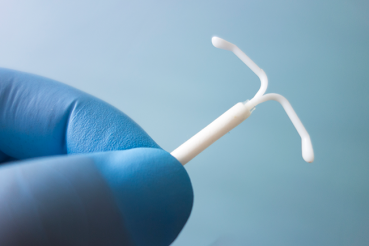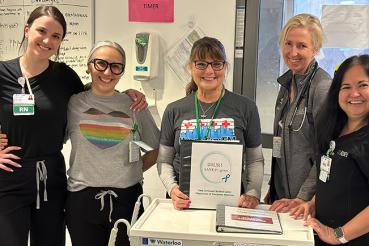Like most of the world, Cicero native Heaven Shelton wasn’t expecting her life to be disrupted by the COVID-19 pandemic. She got sick at the end of 2019 — before most doctors, much less the rest of the community, knew what was happening.
“I was hospitalized for three weeks and on oxygen the whole time,” Heaven says. “They thought I would need a tube placed to help me breathe.”
When she did get out of the hospital, Heaven was on oxygen daily for the next three years.
Finding a solution
During her time in the hospital and her recovery, Heaven gained weight, in part due to the medications she was taking.
Her weight gain and respiratory recovery were causing a vicious cycle — it was hard to make lifestyle changes because of her breathing problems, and her breathing problems were getting worse because she couldn’t make lifestyle changes to lose weight. She knew she needed help to break the cycle.
When she began to consider a medical weight loss intervention, Heaven knew right away she wanted to come to Rush.
“I grew up going to Rush,” Heaven says. “I live an hour away in the western suburbs, and I still come to Rush. I called the medical weight loss team and got an appointment in a week or two.”
Like everyone who comes to the medical weight loss program at Rush, Heaven had a panel of tests, as well as meetings with a dietitian and a psychologist.
As part of her customized plan, Heaven also spoke with a therapist. Heaven got the chance to talk through her concerns, be evaluated for any issues that may come up during recovery and set herself up for success.
“They never shamed me,” Heaven says. “Everything was very comfortable, and what I wanted always came first. They were open and vocal about what comes into play when you’re planning for bariatric surgery.”
Finding relief and recovery
Heaven had gastric bypass surgery on Feb. 5, 2024.
“Gastric bypass surgery makes two major changes to how your body digests food,” says Alfonso Torquati, MD, MS, weight loss surgeon at Rush. “First, we make a small pouch with the top part of your stomach. This is where food will be stored and digested, while the rest of the stomach is bypassed.”
Then, the surgeon also divides the small intestine in two. One piece of the small intestine connects to the stomach pouch, while the other connects to the bypassed stomach. The two pieces of small intestine are then joined at the same place further downstream.
Gastric bypass helps with weight loss in a few ways.
“The stomach pouch can hold less food, which means less calories are ingested and absorbed,” Torquati says. “The food also avoids contact with the first portion of the small intestine. This change decreases hunger, increases fullness and affects hormones and metabolic health.”
During her recovery, she was especially thankful for her nursing staff.
“I was in the hospital for about a week for my recovery,” Heaven says. “I was terrified because it wasn’t my plan — but the nurses were amazing and helped so much. They made me feel so safe while I recovered.”
Almost five months after her surgery, Heaven has lost more than 100 pounds. Her breathing is better than ever.
“Bariatric surgery was literally life-changing,” Heaven says. “I walk four miles a day with my dogs, and I’m not on oxygen during the day. My new lifestyle is different from my old one, and I was surprised at how effortless the transition was thanks to the help of my team.”




